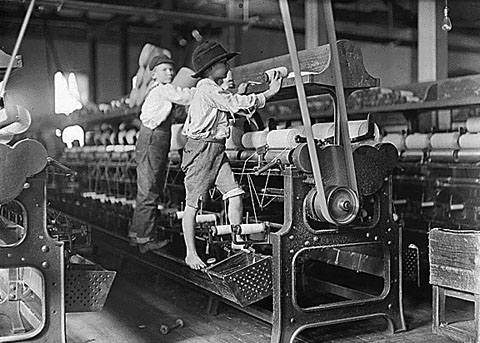INDEX
- ECONOMICS
www.islandbreath.org ID# 0605-05
SUBJECT:
ECONOMICS OF FANTASY
SOURCE: JUAN WILSON juanwilson@mac.com
POSTED: 14 MAY 2006 - 9:30pm HST
Progressivism Past & Present

American child mill workers at the turn of the last century and at a time of industrial expansion
| Is
there a place for Progressives in America today? by James Howard Kunstler on 15 May 2006 in www.kunstler.com Is it even possible these days to define a valid doctrine of political Progressivism? The notion of Progressivism per se really comes from that brief and amazing period in the early 20th century when technological advance was lifting so many out of misery that social justice actually began to seem a plausible political goal rather than an idealist fantasy, and social reformers raced to catch up with the advances of telephones, motorcars, and sanitary engineering. Progressivism also may have been fatally tied to the accompanying reality of robust industrial economic growth, which itself was tied to abundant new energy resources, mainly oil. The belief that more of everything would become available raised the moral issue of allocating it fairly. Since we now face declining energy resources, and perhaps long-range economic contraction, we would appear to also now face the awful task of allocating less of everything -- which may be as impossible in practice as it sounds. So the question now might be: what kind of economic justice is possible? The group that used to composed the broad American middle class of industrial workers and managers is disintegrating economically. What will concern them in the years just ahead will be their ability to barely hang on to what they've got, including the roofs over their heads and their health. They will be in no mood for a political movement that is preoccupied with pseudo-psychotherapeutic exercises in self-esteem building along racial and gender lines. Allocating scarcity will probably be impossible on the grand scale, which is the federal level. The Republicans have succeeded in recent year by enabling the allocation of false wealth, credit, but their ability to continue that will come to an end with the housing bubble implosion, which will destroy the presumed value of the main asset all that credit has gone into: suburban houses. When that happens, there will be nothing to allocate but grievance. True Progressivism sought justice in human affairs, that is, in socio-economic relations that people had some control over. What can we hope to control now? Not the price of oil in worldwide markets. The entire thrust of American life the past forty years has been toward the privatization of public goods. That is why suburbia will turn out to be such a fiasco -- because the public realm, and everything in it, was impoverished, turned into a universal automobile slum, while the private realm of the house and the car was exalted. The private goods of suburbia will now have to be liquidated and we will be left with little more than parking lots and freeways too expensive to use. A true Progressivism of the years ahead has to begin by concerning itself with a redefinition of what our public goods really are -- and in practical, not abstract terms. That's why I harp on the project of restoring the railroad system. Not only will it benefit all classes of Americans in terms of sheer getting around, but it would put tens of thousands of people to work at something with real value. It would also begin the process of healing public space ravaged by cars for almost a hundred years. A true Progressivism would concern itself with the comprehensive reform of all land use laws, policies, codes, and tax incentives that promote more new car-dependent suburban development. A new Progressivism would put dwindling public monies into the re-activation of our harbors and shipping infrastructure. We're going to need it. It would direct remaining agricultural subsidies into explictly organic, local farming enterprises, not to the Archer Daniel Midland corporation. It would revive the legal practice of restricting monopolies in business. It has to lead us in the direction of making other arrangements for how we live. The obvious problem, of course, is that the American public doesn't want to make other arrangements. It wants desperately to hold onto the old arrangements. The nation is stuck with its enormous investments in car-dependency, and what has remained of our economy lately is devoted to creating even more of it -- in the face of signals that we won't be able to run it no matter how much people like it. Progress isn't what it used to be, and it isn't what it seems. If Americans get what they deserve they may give up on both progress and justice. |